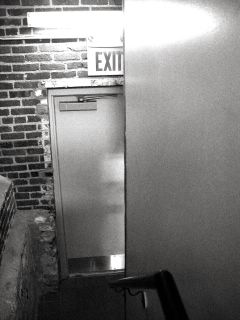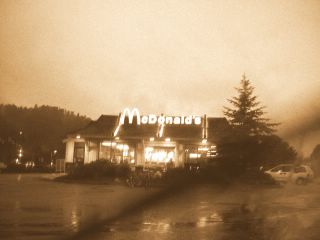
I took this photo in the rundown park just west of KC's preppiest shopping district, The Plaza. If you have the luxury of taking in the full range of scenery (decaying tennis courts and a weedy culvert, just blocks from a three-story GAP and stacks of glittering restaurants) the contrast is enjoyable, in an Ecclesiastes kind of way.
I took this photo in broad daylight, which would have spelled wash-out if it hadn't been for the overgrown shade trees that surround this abandoned swingset. I normally don't deliberately go in for nostalgia, but what better time to indulge than summer?
You should also peep the Friday photos by Joe Thorn and Steve McCoy.
Friday, June 30, 2006
Weekend Photo: Yesterday's Swingset
Posted by
AJ
at
8:02 AM
0
comments
![]()
Thursday, June 29, 2006
Burnout 101
This just in.
I’m only taking one week-long class this Summer, but the assignment load is roughly double that of the most strenuous courses I’ve taken to date. Priority number one, right now, is the 1000 pages of required reading and three book reports—and these are due the first day of class, no less. Academic calisthenics to get us warmed up.
To continue describing this course might give an impression of a very ticked off brand of scholasticism—and I surely wouldn’t want to cultivate that image…
However, if there seems to be an increased stridency underlining my posts in the next month or so, you get one guess where it’s coming from.
Posted by
AJ
at
7:56 PM
2
comments
![]()
Wednesday, June 28, 2006
Meaning of Pain or the Lack Thereof

Pain is a throw-away category in far too many systems of belief, and has resulted in far too many lives being thrown away. If the things I suffer have no meaning, are the inevitable result of karma, are the recriminations of an unappeasable God—then why bother?
I think the weak portrayal of pain is especially pronounced in the faith known variously as materialism or naturalism or Darwinism or atheism. Not only does pain serve no ultimate purpose in a purely material world; its very existence is inexplicable and cannot be posited. Pain is a symptom without a cause.
If I cannot explain the existence of a thing called Good, much less its alter-ego, Evil, then I have no basis for complaining when one happens to me instead of the other. Life is ultimately meaningless, “red in tooth and claw” and governed by a truly chaotic law: blind chance.
The fact that you think something is Good is purely arbitrary. And so is the fact that you think something is Evil. You may as well laugh about the “tragedy” you are crying over, because it may equally be considered a great stroke of luck. (“Don’t you weep/There is nothing as lucky/As easy/As free…We’ll lay in bags as dead as leaves/all together/for eternity”—Bright Eyes)
If this is the way things are, we had better adjust. Either that or deliberately choose a fantasy and forego reality with our eyes open. But the fact is, very few people can live as if Good and Evil (and thus pleasure and pain) are haphazard constructs of the slapdash human mind. This is no accident.
We suspect, no, we are convinced (in spite of ourselves) that there really is a difference between pain and pleasure, Evil and Good. But how to account for it? Materialism utterly fails. Only Christ explains life’s bewildering context in all its gritty bittersweetness.
Posted by
AJ
at
12:24 PM
4
comments
![]()
Monday, June 26, 2006
Donald Miller Repents
Not really. But a recent post at [donaldmillerfans.net] reveals that Donald Miller hasn't discarded the spiritual disciplines (i.e., deliberate exertion in pursuit of Christ) as flippantly as an earlier comment may have implied. (Note my generosity in using the word "may." ;)
In response to a question I'd posted, Don wrote:ariel, i tend to avoid ritual because it tempts me to replace “action” with devotion. the two can go hand in hand, but they are more comfortable separated. while disciplines help us love God, they are also the ego’s favorite food.
Since disciplines in the Bible are portrayed as absolutely vital and absolutely not "ritual," I had a problem with Don's take. (Context and my discussion is here: Donald Miller Answers My Question - Sort Of.)
However, in light of his new post on Spending Time With God, it appears that Donald Miller hasn't jettisoned the spiritual disciplines, since he's currently setting himself the challenge of reading the Bible "straight through." Good to hear, Don.
Posted by
AJ
at
9:42 PM
5
comments
![]()
Soul Change: A Continuum of Revivals

A need for revival is triggered by the fact of being alive.
The contrast between what I need and what I have is enough to make me hungry for a change. “Whoever believes in me,” says Jesus, “streams of living water will flow out of his innermost being (John 7:38).”
This sounds good. This sounds like an elixir that could defeat inertia. Or a fountain to reverse the course of jaded aging. Something sweet and swift and beautiful, a fast-moving river where the fetid silt of sin can’t settle. “Streams of living water,” I think, are what I need.
I stick a finger in the pool inside my heart, and something big stirs down below. Ripples fan out and I jump back, concerned. This water is not flowing—it’s not clear or cold or refreshing. It’s so murky that it’s hardly water. Although I try, I can’t convince myself that I am coursing with the Jesus-streams of life. I need a change.
And a change is just what Jesus calls for. “GROW,” Christ says to the 5’4” man. “FLOW,” he says to the girl with no rhythm. “Do what you CANNOT DO and be who you CANNOT BE. Put on your strength and your beautiful garments which you DO NOT HAVE.” (Revelation 3:1-3).
To the beggar, Christ says, “Get up, carry yourself like a man, and walk with the confidence of a corporate exec; don your Armani suit with the Ray Ban shades.”
“But—” says the beggar.
“I know,” says God. “What I am really saying is COME WITH ME. I’ll put an end, not only to your begging, but to your beggarly spirit. I can do in you what you can never do yourself. Come with me.”
The impossibility of the commands God gives us to fulfill (“Be perfect, as I am perfect”) awakes us to the fact that we will never really start living without revival. The revival arrives when Christ enters our lives and uncorks an artesian spring inside us. This could be called the first, and greatest of revivals. However, it is one that occurs again, and again, and again, as pure spring water clashes with the marshy ground of my soul, most fittingly called bottomland.
I know that I will never grow out of my need for the gospel, of my need for fresh forgiveness, fresh empowerment, fresh change—a fresh start. Revival will always be with me because I will never outgrow my need for the Spirit of Christ to change me—to repeatedly wash and quench me with his streams of living water.
Posted by
AJ
at
6:11 PM
3
comments
![]()
Saturday, June 24, 2006
Infinite Perfection—& Eternal Life to Look it Over

A couple days ago it occurred to me that Heaven is a logical, mathematical, unavoidable necessity in light of who Christ is.
When a God who is infinitely good chooses, as a means to his glory, that his goodness should be explored and enjoyed by humans, eternal life naturally follows.
Infinite paradise is the natural consequence of an unfathomably perfect God. He cannot be known in a year, or in a hundred billion years. Eternal life is the only theater for seeing and savoring Christ.
Moreover, on this framework I feel absolutely comfortable in asserting something else: Heaven will be the scene of progressively sharper joys, of increasingly better pleasures. Our experience of happiness in God’s presence will not be static, but dynamic—ecstatic happiness, and more and more so.
This is because, as we grow (millennium by millennium) to know Christ better, the joys we experience in Heaven cannot help but grow as well.
Jonathan Edwards said, in so many words, that someone who embraces all the beauty of creation with goodwill, but does not embrace Christ, is infinitely parochial.
Infinitely parochial. I love Edwards, not only for his Christological brilliance, but for the heart-stopping precision of his terms.
Imagine the person who lovingly gazes at fireflies through his back screen door, but cannot find it in his heart to look upward to the stars.
Posted by
AJ
at
10:06 AM
3
comments
![]()
Friday, June 23, 2006
Dying Yet Behold We Live
Sermon prep is finally underway. Here's a quick slice that may or may not make the final cut.
::
For now, pain creates an encounter, a portal, perhaps, to another world, because Christ was a Man of Sorrows, but he is sorrowful no longer. When our hearts begin to ache, we throw open the closet door where we conveniently stored Jesus, and call him to come forth to us.
We don’t realize that at the same time Christ is calling to us, like he called Lazarus: “COME FORTH!”—and Christ is standing on the other side of the grave. We have mistaken the living for the dead, the liberation for the shackles, but the pain drives us into the “closet” where Christ waits in the “darkness.” And then we realize, as C.S. Lewis says, “The inside is bigger than the outside.”
Where Christ stands, it is never dark. Suffering has no staying power. We have discovered Ultimate Reality because we stumbled into pain, because we began to carry our cross.
Posted by
AJ
at
5:07 PM
0
comments
![]()
Weekend Photo: Urban Descent

I snapped this shot in a parking garage a couple blocks from our apartment. Afterwards I adjusted the contrast to make the picture snap (note the washed out, sunlit sidewalk), but the "hellish" red glare comes from the garage's below-ground lighting, reflected off stained concrete.
You should also check out the work of Joe Thorn and Steve McCoy.
Posted by
AJ
at
10:05 AM
4
comments
![]()
Wednesday, June 21, 2006
Junk Book Binge

After my semester ends, I typically feel justified in reading a handful of books that would never see the light of day during the academic year. I justify it in the same way that a healthy eater justifies swinging by McDonald’s after not touching junk food for six months.
Usually, my biannual trips to McDonald’s end with a conversation where “cardboard” is mentioned several times. I guess if I’d been really astute, I would have benefited from the MD’s parallel and eased up on my justified junk book consumption.
Love dictates that we should make an effort to “believe the best” about people, but this dictum doesn’t hold true for books—especially after the first 50 pages. Nevertheless, in the last couple weeks I’ve made my way through two disposable novels, stubbornly hoping that the best was still to come. It wasn’t.
I guess there is some benefit in documenting time lost to junk books (in search of wasted time, ala Marcel Proust), in that it could remind me not to do this again. And at the very least, it points up the contrast between throwaway lit and the really good stuff. Just be warned: these books will definitely not appear on the Master Book List. In House (Ted Dekker & Frank Peretti), the authors begin writing a gritty suspense-thriller, then attempt to change ship midstream and craft a spiritual allegory. The parallels are strained, to say the least, the supernatural drama is overdone. I came away wondering who the intended audience was. If Dekker and Peretti were writing to Christians, then an occasional adrenalin thrill (it is a fast read) is the only real draw. If they’re hoping to influence a secular audience, then the gospel is unnecessarily macabre and watered down.
In House (Ted Dekker & Frank Peretti), the authors begin writing a gritty suspense-thriller, then attempt to change ship midstream and craft a spiritual allegory. The parallels are strained, to say the least, the supernatural drama is overdone. I came away wondering who the intended audience was. If Dekker and Peretti were writing to Christians, then an occasional adrenalin thrill (it is a fast read) is the only real draw. If they’re hoping to influence a secular audience, then the gospel is unnecessarily macabre and watered down.
 In Lavondyss (Robert Holdstock), weirdly paced action, pervasive occultism, and an unintelligible plot marred the sequel to Holdstock’s somewhat gripping Mythago Wood achievement. The new “heartland” is bloodier, harsher, and ultimately overreaches itself. I won’t be back.
In Lavondyss (Robert Holdstock), weirdly paced action, pervasive occultism, and an unintelligible plot marred the sequel to Holdstock’s somewhat gripping Mythago Wood achievement. The new “heartland” is bloodier, harsher, and ultimately overreaches itself. I won’t be back.One upshot of my having read these books is that now my tentative Summer Reading Ideas have hardened into a gritty Plan of Action. I want to get this cardboardish taste out of my mouth. (Note: I'm not saying that "pulp fiction" is worthless and bad, per say, but that even a fast, lightweight read shoud be done well.)

Thanks to a query from Verashni, C.S. Lewis’s The Pilgrim’s Regress is near the top of the pile. This is one of the last books in the Lewis canon that I haven't read in its entirety.

Mark Driscoll’s Confessions of a Reformission Rev.is also on tap. I'm planning to read Driscoll's book before I go hear him speak at this year's Desiring God conference.
 A couple days ago, while listening to Garry Wills’ excellent biography of Saint Augustine, I heard a phrase dear to the influential philosopher and theologian: “Sailing toward an ever-receding shore.” This phrase, which Augustine drew from his favorite poem, Virgil’s Aeneid, was one of the metaphors which he used to characterize his exploration of an infinitely perfect Christ. The line was so beautiful that I resolved to read The Aeneid on the spot.
A couple days ago, while listening to Garry Wills’ excellent biography of Saint Augustine, I heard a phrase dear to the influential philosopher and theologian: “Sailing toward an ever-receding shore.” This phrase, which Augustine drew from his favorite poem, Virgil’s Aeneid, was one of the metaphors which he used to characterize his exploration of an infinitely perfect Christ. The line was so beautiful that I resolved to read The Aeneid on the spot.
As well, I’ll continue to make my way through Eugene Peterson’s introduction to “spiritual theology,” Christ Plays in Ten Thousand Places.
So there’s a look at my partial summer reading list. Apparently some good can come from junk books after all, in a kind of accidental, roundabout way.
Posted by
AJ
at
5:45 PM
3
comments
![]()
Tuesday, June 20, 2006
Bittersweet Preaching?

This Sunday I get a chance to give a message at my church, which raises the inevitable question of what topic or Bible passage to address. After considering several possibilities, I think I’ve come to a conclusion, and my subject will be…
…Bittersweetness.
Luckily for me, bittersweetness is a very prominent theme, not only existentially, as we feel it in life, but in the Bible. (This makes a lot of sense, since the Bible is the key to understanding this story we find ourselves in, and therefore speaks to the paradoxes that confront us, including bittersweetness.)
The central theme of my talk will be the way that joy and pain come to us in this life—not as separate entities, but as interwoven threads, a mosaic of dark and light colors, both elements of a black and white photo.
Biblically, my starting point will be 2 Corinthians 6:8-10:We are treated as impostors, and yet are true; as unknown, and yet well known; as dying, and behold, we live; as punished, and yet not killed; as sorrowful, yet always rejoicing; as poor, yet making many rich; as having nothing, yet possessing everything.
A more bittersweet passage is hardly imaginable. Something I’m thinking about a little is how to present my topic… John Piper gets to paste his catchphrase (“Christian Hedonism”) across his messages and the front of his book, but then…he has a book. He also has the advantage of being somebody. I’ll have to weigh the benefits of throwing “Bittersweet Life” out there.
At any rate, I think that converting this blog's basic premise into a spoken message will be a healthy challenge. (Your prayers would be very welcome.) I'm trusting that doing this will help me continue to develop deeper biblical and theological foundations for what I've found to be a very helpful understanding of our current setting. Life on earth is pain. Life in Christ is pure joy. Therefore, life is bittersweet.
::
As I was typing this, I realized a bunch of you will probably want to fly in to hear this seminal message. So as you make your travel plans, keep in mind that we have three spare futons, as well as overflow space on the linoleum kitchen floor.
Posted by
AJ
at
4:37 PM
7
comments
![]()
Monday, June 19, 2006
Aidan’s Girl Trouble

His life has barely started, but Aidan has already begun to spend quite a bit of time in the exclusive company of women. Due to his age, I’ve had mixed feelings about this, wondering if the little charmer has the necessary judgment to handle the moral dilemmas such situations can provoke.
Fortunately, after attending a baby shower for his cousin Brenna, Aidan confided that he has begun to have some misgivings about all the female hobnobbing.
As Aidan put it, “Dad, the problem with playing tag with the ladies is the…well, this will make me sound like a jerk.”
“It’s OK, Aidan. I’m good at reading between the lines.”
“Well…the jealousy makes me feel bad.”
“What?”
“You know, everyone wanting my attention at the same time. I only have two eyes. I only have one smile. It’s inevitable that someone feels left out.”
“Yeah, I see what you mean.”
“I just feel sorry for the women I don’t get to talk to. And then—”
“Yes?”
“Sometimes there are other people my age present.”
“Other babies, you mean?”
“Dad, can you be a little less demeaning?”
“Oh, right. Just take it as a term of affection. So, other bab—I mean, other young people are present. So what?”
“This will make me sound like a jerk again.”
“No problem. Say it like it is.”
“Well, it just doesn’t seem fair. People always feel obligated to ‘introduce’ the ‘babies’ to each other,” (Aidan raises his eyebrows), “and then…comparisons are inevitable.”
“Comparisons?”
“Yeah, between me and the other young person. Have you ever seen a mother take a look at her own child, compare her to you, and burst into tears? It makes me feel bad.”
“Well, Aidan, it’s not your fault. If you feel yourself getting a big head, just remind yourself it’s in the genes: in God’s hands, out of your control.”
“I know, but I can’t help feeling—”
“Yes, you can. Look: the right thing to do is be friendly to as many of the young ladies as possible, maintain a humble stance, and don’t feel bad if other people take it upon themselves to make undue aesthetic comparisons.”
“Well, OK. Thanks, Dad.”
“No problem, son. I love you, you know.”
“I know. And I love you too. Hey, can you throw me in the air a few times this evening?”
“The chances are good.”
Posted by
AJ
at
7:21 PM
4
comments
![]()
Saturday, June 17, 2006
Bitter Self-Knowledge Makes Transformation Sweet

I've studied myself far more closely than I care to. I’m a book I’ve read too often. It was better to be naïve and young. At least, it was better for the cultivation of nice illusions. In the interests of self-image, no one should be allowed to be his own best friend.
Nevertheless, making the best of a bad situation, I have gained a deep appreciation, a keen anticipation, for the day when this broken machine called Ariel will be conclusively put to rights. Colliding intentions and actions will stop claiming victims, the stupid dialectic of the lovely and the selfish will be buried six feet under. Unadulterated beauty will spit in Hegel’s eye.
I’ve lost the amber glow of my own self-scanning glasses, the lustrous belief that there are no limits on what I can do and be. But I’ve gained a longing for heaven. Soul renovation: One day I’ll be Christ’s little brother, and that means perfection.
I guess this is what you would call a fair trade, in reality beyond fair—exchanging a human superstition for a divine reality. Honesty is bitter on the tongue, but the after-taste is otherworldly sweet.
Posted by
AJ
at
1:48 PM
0
comments
![]()
Friday, June 16, 2006
Does "Spirituality" Have Physicality?
Or, Does Faith Have Weight?
Those of you interested in language, or those of you who would like to be interested in language, may want to take a look at the brief piece I wrote on the Vocabulary Reclamation Project re: Eugene Peterson's "spiritual theology" book, Christ Plays in Ten Thousand Places.
(Or not.)
In the VRP post, I talk a little about some comments Peterson makes about the evolution of the word "spirit," which used to convey an earthy, evocative physicality, and now expresses a kind of pallid, limp interest in invisible stuff.
I'll be posting more on Christ Plays in Ten Thousand Places here in the next several days. I've only read the preface, but I'm already impressed. I guess you would say that's a good sign.
Posted by
AJ
at
10:16 PM
2
comments
![]()
Weekend Photo: Golden Wood

This picture was taken in Wallace State Park (MO) in the late afternoon. I used the shadow cast by the tree to capture the glowing background without overexposing the shot.
Posted by
AJ
at
7:00 AM
4
comments
![]()
Thursday, June 15, 2006
Yutter...Smooth as Butter

I know that on a blog with decidedly hip, un-techie undercurrents, it’s probably not cool to post two tech updates in a week. Still, sometimes circumstances dictate policy. And this tech update will be short, I promise.
No doubt a bunch of you are experiencing the current RSS feed craze, and experimenting with new means of accessing your favorite web content (i.e., this blog ![]() ). However, the ability to read dozens of news sources in one place (for example, via Bloglines, my favorite RSS feed reader) hasn’t entirely eclipsed the convenience of having your favorite news (i.e., BitterSweetLife) delivered straight to your e-mailbox.
). However, the ability to read dozens of news sources in one place (for example, via Bloglines, my favorite RSS feed reader) hasn’t entirely eclipsed the convenience of having your favorite news (i.e., BitterSweetLife) delivered straight to your e-mailbox.
To that end, I’m switching my RSS email service from Feedblitz to Yutter. Feedblitz was reliable, but I’m guessing I wasn’t the only one who got tired of the annoying orange logo glaring at me from my inbox every day.
So, all you email subscribers will be switched over to the more innovative, easier-on-the-eyes, Yutter. (You may be wondering, What’s with the name? And, like you, I’m realizing, I have no idea.) To enjoy this upgrade, you need do absolutely nothing.
If you aren’t an email subscriber, now’s a good time—maybe the best time—to become one. Feedblitz is deprecated, Yutter is elevated, and good times are ahead.
Posted by
AJ
at
8:02 PM
1 comments
![]()
Wednesday, June 14, 2006
God's Perplexing Approach to Redemption
True, the cultural terrain would have been slightly different two thousand years ago, but I’m confident that I could have helped God script his public appearance. I’m not denying that Christ accomplished some good things. Great things, even. But his PR department left a lot to be desired.
Number one, people like glamour, smooth talkers, sexy personas. We like to feel like we’re part of the next big thing. Swept up in the crowd, riding the crest of the wave, you know. Jesus missed the next big thing boat entirely. True, he was the eternal big thing—but when the crowds offered to crown him as the Jewish Messiah-King? And he walked out? Wow, we can only sigh at what might have been.
Number two, you have to give it to people straight. None of this evasive talk about believing first and understanding later. Journalists know they have to cram the heart of the story into the first four sentences. Likewise, when people tune in for a religious broadcast, they expect to hit pay-dirt. Ideally in a seven-step format. What were these parable-stories that Christ was always spinning? Did he really expect his studio audiences to use their hearts and imaginations and not just a few gray cells?
Number three, we consumers like a visible delivery system. We want bright logos and prominent branding. When we sink our money in a product, we expect to ride the brand name for awhile. Translation: When spirituality is the product, almost anything would be a better delivery method than the concept Christ came up with. I mean, “the Spirit?” C’mon! When your brand name is not only invisible but elusive, like breath or wind, I think the problem is self-evident. Much more could have been accomplished with dramatic chants, ritualistic ceremonies, self-mutilation, or, at least, fireworks.
Other suggestions occur to me (Christ’s narrow-minded claims to truth, the insensitive moxie with which he stood down his opponents) but I guess I’ve made my point clear. The way God carried himself on earth is ridiculous, and anyone can see it. No wonder he is taking hits in the polls. No human in his right mind could have come up with a plan of redemption this outlandish.
Posted by
AJ
at
7:36 AM
8
comments
![]()
Tuesday, June 13, 2006
Del.icio.us Indexing Underway

One of my projects this summer is to finish indexing this blog using del.icio.us, the online bookmarking tool I use to track the many and varied topics that crop up here (sometimes catching even me off guard).
My del.icio.us index (the BitterSweet Matrix, I call it) so far is fairly comprehensive, but I haven't finished adding all the posts from the archives. Updating is underway, though, the upshot being that more posts will be appearing in existing categories, and new categories will be created. The Jason_Bourne tag, for example... Who knows, maybe the topic you've been waiting and waiting for me to address has already shown up?
Exciting stuff.
Posted by
AJ
at
4:59 PM
2
comments
![]()
Monday, June 12, 2006
Conscience in Mere Atoms - A Ghost in the Machine

Over at my friend Aditya’s blog, I’ve been part of a conversation regarding the tenability of Atheism vs. the necessity of Christ. One of the claims that has come up is the supposed coherence of the people = matter perspective. Which is to say, we’re 100% biology, our emotions can be hormonally accounted for, and "the mind" is a riddle that Science will eventually solve.
I believe this idea is untenable on multiple levels, the first being that it amounts to making a religion out of Science. To believe that Science will eventually answer all questions and solve all mysteries, given adequate time and resources, is a mentality that amounts to “faith” in the extreme—since it must be held in defiance of the Mind vs. Brain enigma, the mind-boggling complexities of DNA, and other current fields of investigation.
Today, however, another difficulty with the machines-made-of-meat analysis occurred to me. Problem being:
If I am a biologically-driven animal through and through, my “primal” instincts are easy enough to account for. Eat, drink, be merry, etc. Convoluted arguments have even been presented to explain why altruistic actions can be made to coincide with a materialist framework (I don’t buy them). But suppose that I am eating, drinking, being merry, even sending some money across the ocean for disaster relief in the hopes that it will help out my tribe in the long run. All clear so far, right?
But then another instinct kicks in, this one more like a voice, a moral sensation. It sometimes occurs at what are, biologically speaking, the most inconvenient times. I’m about to save major face, or complete a power grab that will help assure the well-being of my descendants. Then this voice chimes in—rebelliously challenging my naturalistic impulses—and questions whether I’m doing what I should be. Pure insolence.
Sometimes the moral voice even pushes me in a direction entirely contrary to my “primal” feelings. I find myself doing things that will end up losing me friends, or moving me away from attractive women, or costing me financially, just because they are “right.”
Is evolution fighting against itself?
I see no way that a purely materialistic worldview can account for the existence of this mysterious thing we call “conscience.”
Posted by
AJ
at
5:01 PM
4
comments
![]()
Sunday, June 11, 2006
The Corn Tortilla of Death
It seldom pays to question a woman’s refrigerator management.
Me: “Where are the corn tortillas? Are there any left?”
Lindsay: “I don’t know. I didn’t eat any corn tortillas.”
Me: “Oh, there they are. In a place so obvious only I could have put them there.”
Lindsay: GRRAARUGHRAAGH! Honey, I feel aggression toward you!”
In these very tense moments, I’m just thankful for my unassuming demeanor, which has defused situations far more desperate even than this.
Posted by
AJ
at
10:16 PM
3
comments
![]()
In the Morning I Need Light

It should never be said that simplicity and profundity cannot coincide. Oscar Wilde quipped that "the truth is never pure and seldom simple," but he was overlooking an important tool here: eyes.
Case in point: In the morning I need light. The sun rises, and what a relief. It arrives just in time, because I grab it and hang on.
Not just occasionally, not just once every couple weeks, but every a.m. when the alarm goes off and I kick back the covers, jump across the carpet, and slam back the button that will put an end to the piercing blare. Believe me, I need light.
The need goes beyond the unnamed law which states that without it I will not reach full consciousness, let alone remain there. It goes beyond the fact that without it I would continually stub my toes on the way into the bathroom. And the verifiable theory that without light I could not brush my pearly whites or style my GQ hair. (Forgive the embellishments there.)
My need for light is more profound, as deep as the hope that pushes upwards through my rib cage when I actually see the dawn. Every morning my day needs a center, a fiery star to unveil the world around me once again, give a modest clarity to this place in which I live, and help me grasp once more, with an adequate certainty, just where it is that I am headed.
The first-century theologian Paul put it well: "For God, who said, 'Let light shine out of darkness,' has shone in our hearts to give the light of the knowledge of the glory of God in the face of Jesus Christ" (2 Corinthians 4:6).
That initial commanding of light was an act of pure creative power, a making of light ex nihilo, out of nothing. Since I've come to know Christ, a similar thing has taken place in my heart, a spiritual creation that gives warmth and sight. There is light, the kingdom of God, where there was only darkness before.
This new light-making depends on the glory of God, so dramatically revealed in the flesh and blood face of his son, Christ. Now something similar is happening in me, morning by morning. Christ is giving me, and everyone who knows him, a startling alternative to darkness: Christlikness. This is the reality that drives me to the Bible and to prayer, day after day after day. No makeshift spirituality here, but simple desperation. I need my daily Christ-light like I need daily water. I need to know who and where I am, who and where I'm headed toward.
Without my light at daybreak, I'd be stumbling all day long. So sit down Oscar Wilde. It's a pity you missed this truism. When I see the sun rise, I'd be a fool to forget what I need each morning: Light - and not just sunlight, but the meteoric light of Christ.
Posted by
AJ
at
5:54 PM
0
comments
![]()
Saturday, June 10, 2006
Lawn Care, Mountains & Theology Collide

During summer vacation I leave behind my lofty status as a teacher associate (sub) and apply myself to the intricate responsibilities entailed by a lawn healthcare specialist position. Mostly this means cutting down weeds and hoping they won’t grow back.
But every job has its little perks.
Numero uno is the fact that the lawn service (owned by enterprising younger brother—no kidding) has acquired headphones and CD players this year. So day after day, covered with grass entrails and sweat, I’ve been soaking in much more than sun. Hour after hour of John Piper, Ravi Zacharias, and other brilliant thinkers, has been ingested.
While my arms are wrestling the overheated weed-whacker, my mind is scrapping with the likes of Martin Luther, Jonathan Edwards, and Augustine. While I’m scanning lawn edges for symmetry, my inner eye explores subjects like Calvinism, suffering, and sex and the supremacy of God.
In light of all this, mud sprayed in the eye doesn’t smart quite as much.
Perk number two involves another climate, another time—almost another world. No, not heaven, in this case, but Colorado. In August I’m planning to make a Long’s Peak summit attempt with some friends and family, an effort that will demand considerable strength and stamina. Long’s Peak, the Rocky Mountain Park system’s most infamous 14K mountain, is a 16-mile day hike that has claimed its share of incautious victims.
Several weeks ago, weakened by the pale glow of extended classroomitis, I wouldn’t have had a fighting chance. But few things increase physical grit like eight-hour days spent striding through 90 degree heat, carrying equipment at all times. If my biceps and calves are any indication, Long’s Peak has already been conquered. I will just need to show up and claim the victory.
All this goes to show that sometimes opportunity goes around strangely dressed. Sometimes she wears this kind of sweaty, muddy green.
Posted by
AJ
at
3:02 PM
3
comments
![]()
Friday, June 09, 2006
Weekend Photo: City's Edge

Those of you who have been around this blog awhile will have seen this shot before...but in the interests of the new Weekend Photo institution, I'm adding this picture to the parade. I took it a few blocks from our apartment, and adjusted the contrast. You should also check out Joe Thorn's provocative shot. Steve McCoy's misty vista isn't bad either.
Posted by
AJ
at
9:41 PM
0
comments
![]()
A New Reason for Living (Jayhawks)
 The Big 12 basketball tournament will be held in Kansas City, MO, in 2008. Within walking distance from our apartment, no less. This is old news for some of you, but I had to mention it because of the obvious new incentive for wage earning, joy, and general life purpose that the tournament will provide. Just thinking about the Jayhawks holding court next door, I feel new inspiration welling up inside to keep on going. ;)
The Big 12 basketball tournament will be held in Kansas City, MO, in 2008. Within walking distance from our apartment, no less. This is old news for some of you, but I had to mention it because of the obvious new incentive for wage earning, joy, and general life purpose that the tournament will provide. Just thinking about the Jayhawks holding court next door, I feel new inspiration welling up inside to keep on going. ;)
Now, if I can just be pulling down a sizeable salary by 2008…
Posted by
AJ
at
9:16 PM
1 comments
![]()
Wednesday, June 07, 2006
People on the Way: Sanctification
How Do We Become Like Jesus?
Over the course of their lives, do people really change that much? If they don’t change in drastic, visible ways, how much is this change worth? I’m not a big fan of little moral victories. As the above may or may not communicate, the question of sanctification has been haunting my thoughts lately.
One conclusion I’ve come to is that on earth, the Christ-like transformation we experience is best considered a progression, a trajectory, than any kind of facsimile. In other words, we’re being gradually hewn into a rough likeness of Jesus, not a finished statuette. What matters is the direction in which the work is being taken.
This is immensely encouraging, since my life is about a third over, and my Christ-likeness, last time I checked, stands at roughly 6%. It’s not even NCAA hoops season, but if I was hoping to become precisely like Jesus in this life, I’d quit right now and head home for some TV.
This is why 1 John 3:2 is such good news: “Beloved, we are God's children now, and what we will be has not yet appeared; but we know that when he appears we shall be like him, because we shall see him as he is.” The really sweeping instant of change is reserved for heaven.
I also like to think of people as keys. Old, clunky keys, at first, but keys which work, nonetheless. At the moment we believe in Christ, we enter this key-hood. Keys, of course, are meant to unlock something. The thing that we unlock, as God’s children, is the glory of God.
At first we reveal a mere glimmer, then more and more. Over the years, we unlock portals to wider prospects of Christ’s glory. But they are always mere doors—momentary glimpses, limited facets of an infinitely good God. And we are always mere keys, mere clues and signs, mere sparks of Christ’s all-consuming light.
But this will not always be the case. Consider:
“And we all, with unveiled face, beholding the glory of the Lord, are being transformed into the same image from one degree of glory to another. For this comes from the Lord who is the Spirit” (2 Corinthians 3:18).
The glory that we come to display has a transforming effect. In the end, our brief, fragmentary resemblance to Christ will be swept up into a consummate likeness. In an instant, the murky outlines of earthly sanctification will snap into vivid, mirror-image focus. We will not be God. But we will be, like Christ, humans who can do no wrong.
This is the grand finale that we have to tide us over, and it is best to take the long view. On the day we see Christ face to face, we will be instantaneously perfected. Every pain we took, every frustrated tear, each desperate prayer, will shine with retrospective light, and we will see, like Paul, that the sufferings of God’s children in the present times aren’t even worth comparing to the glory that lies ahead (Romans 8:18).
When the merely Christesque flames into perfect similitude, we will say, “It was all worth it,” and then laugh out loud at the immensity of the understatement.
Posted by
AJ
at
9:12 PM
3
comments
![]()
Tuesday, June 06, 2006
Dumbing Down God’s Omnipresence
There is something remarkable about the pervasive presence of God, and I mean something besides its existence. Consider, in addition to the mind-bending reality of God’s presence everywhere in his creation, the fact that it is habitually downplayed and overlooked.
Most of us are cautious about provoking our friends’ disapproval: the averted faces, raised eyebrows, and awkward silences are a censure that few of us care to casually risk. Instead, we circumvent it. We cram embarrassing behavior into a quiet sector of our lives and label it “private.”
As it turns out, this designation is purely arbitrary. Nothing we do is really private.
We often—no, we typically—forget the closest friend of all, the One who watches everyone. Not a sparrow dies without his knowing it. Not a grass blade grows without his noting it. Do we really think he doesn’t notice our backroom behavior? Or perhaps, at some point, it became more comfortable to forget? Yet recalling God’s omnipresence is vital.
After every offense, God waits for the perpetrator to turn and meet his eye. God waits with an offer of grace that must be approached through the pain of guilt admitted. His admonishment, when it comes, is much less infantile than human reprimand—and much more stinging. How else could it be, when my Creator and Master, my very Owner, looks at me with sorrow in his face?
When I, as a sinner, grow aware of my Savior’s glance, my heart will bow low and I will weep like Peter did at the sound of a cock’s crow. But as I do so, I will also remember the heavenly morning on the beach, when Christ returned, caught Peter’s eye again, and healed his shame with forgiveness. The healing was not painless, but it was transforming.
If Peter had not met his Master’s gaze, he could never have been the masterful leader, the strong theologian, the rock-solid martyr, that he became. Once Peter learned to look his Savior in the eye, he left his sullen remorse there by the sea, and began to live like an inspired man. What was more, he learned an invaluable lesson: that no matter where he went or who he spoke to or what was done to him, he was never alone.
Neither are we ever alone. If we fail to grapple with the gaze of God, to turn to Christ for mercy in the moment of trouble (Hebrews 4:16), we will never progress beyond a sense of brooding guilt—psychologically buried, perhaps, with busy work. We will spend our hours pulling on empty nets and wondering what could have been.
I often think that societal mores, dutifully observed in public, are a poor man’s substitute for the countercultural renewal of repentance. We invest our lives in embarrassment-avoidance, when deliberate investments in the bank of repentance would lead miraculous dividends: the friendship of Christ himself.
He stands beside you now, after all.
Posted by
AJ
at
10:10 PM
0
comments
![]()
Monday, June 05, 2006
Spiritual Rebirth: Christ’s Kingdom Inside & Out

When I think about the event traditionally called “salvation,” or spiritual rebirth, I am forced to grapple with the miracle that is Christ entering a life. That he does enter is the definite fact. The logistics of this spiritual genesis, however, are more elusive.
When Jesus intersects with a life, what happens next is a haunting—in the ancient sense, a hallowing. A new dynamic is unleashed inside us, a new energy that commingles and changes the impulses of mind and heart. It may be dangerous, however, to speak in terms of “a dynamic” or “an energy,” because the new presence is vividly personal. The change that mysteriously comes over us is nothing less than, or, more accurately, no one less than, the spirit of Christ himself. He crashes through all barriers and takes up residence inside us.
What does not happen next is the “Christian” valet service so many people take for spiritual living. Jesus does not put himself at my disposal, a source of footnotes for my big decisions; I don’t get to carry him around in my back pack, an oracle more convenient than Zeus. I will never become an independent agent, endowed with super-soul-power, calling in the Top Gun when time and mind allow.
There can be no doubt about who is calling the shots: not me. There can be no doubt about who is building my life to suit: Jesus Christ. In the scuffed recesses of my soul, blueprints that no human eyes have ever seen are triumphantly unrolled. Coming up fast: more than cosmetic changes.
Though it will take time for our exteriors to conform, I like to think that our inner contours are immediately changed. The lines of an internal kingdom are redrawn. Where roads once led to dark woods and marshy ground, and nowhere else, there are now paths and byways into sunlight. Surprising vistas open inside us where before there were trapping chasm walls.
In legal terms, the darkness that once ruled us has been saddled with a buyout clause. Every previously-ironclad contract with evil is now breakable, at the right price; and grace gives us the currency to pay every time.
Theologically speaking, our “free will” now encompasses something it never did before: Goodness. We can suddenly walk out of this morbid, familiar, land of shadow which we previously took for “freedom.” We now have the option to choose against evil. The days of knee-jerk addiction are over.
This is because Christ places in our hearts a fiery, transforming inner kingdom—his own—that dwarfs the very world we walk in. We learn, like C.S. Lewis, that “the inside is bigger than the outside.” But “the inside” will not always remain within. Christ’s kingdom sometimes blazes through us and into this world, and one day his realm will overflow and melt it all away.
To return, then, to what happens when we come to believe in Christ, and his Spirit enters our lives: In a sense, we have changed—abruptly, dramatically, irreversibly, DONE. Jesus has arrived to stay, and there is no evacuation plan. But it would probably be more accurate to say that we have begun to change. The walls of our souls our thick, and Christ begins to carve them away so that his kingdom life escapes. We are caves leaking light. Towards the end, Christ will be seeping out everywhere through cracks in the walls. And then…
I know, for one thing, that heaven will be the place where the soul-walls give way like an primeval dike and the kingdom within rushes out—only to be met by the same Christ-kingdom flooding in. The correspondence inside and out will be sudden and complete. Free at last.
This unity of motive and act, desire and pleasure, heart and mind, swept up in the perfection of Christ, is the experience that heaven is a word for. It has been a long time coming, we may think. But ever since Christ entered, the foretaste was with me.
Posted by
AJ
at
9:50 PM
1 comments
![]()
Sunday, June 04, 2006
This Just In: Weekend Buzz
A couple days ago, Lindsay was walking up to our apartment with her mom, when a homeless guy approached with the spiel about desperately-needing-cash-to-take-a bus-across-town-to-visit-his-dying-mother-in-law-and-her-starving-cat. He gave a decent rendition, and in return, Lindsay told him that she couldn't give him money but she would be happy to go upstairs and get him some food.
He said, Sure, that would be great, and then preceded to the issue of menu. "What kind of food? A burger or somethin'?"
Lindsay told him probably not, seeing as she would have to be marvelously quick on her feet to bustle upstairs, pull on her apron and hair net, and fry up a burger, then rush it down while the customer waited... However, the homeless guy was willing to overlook this lapse. (Or so he said at the time; in reality he split before the food arrived.)
Here in KC, we pride ourselves on having some of the most epicurean homeless people in the country.
::
In other breaking news, I discovered yesterday that some readers have reached this blog by Googling "meaning of smart ass." In true bittersweet fashion, I reacted to the news with a mixture of pleasure and indignation.
Of course, it is, and will no doubt remain a mystery as to how those search terms could be in any way connected with this blog.
Posted by
AJ
at
6:35 PM
5
comments
![]()
Friday, June 02, 2006
Grace Means Giving Up

If I am really drowning in a pool of self, and the evidence seems good, then I won’t be able to suction the pool dry on my own. I’m in the pool, sunk in me. Pumping it dry would be like pulling up the carpet while I’m standing on it.
So you won’t find me laboriously bailing the self out of my soul to “make a space” for Jesus. Christ will need to make room for himself. Fortunately, this is precisely what he intends to do.
The message of grace goes something like this: Put down the sump pump and step away from your cellar-like soul with your hands in the air. Grace requires a whole-hearted abandonment of “self-improvement.” Later there will be a place for work. But never at the point of redemption.
Posted by
AJ
at
10:26 PM
6
comments
![]()
Thursday, June 01, 2006
Weekend Photo: Tree Frame

Surprisingly enough, I took this picture on my seminary campus, which is not known for its great aesthetic appeal. However, it's all about how you frame your shot... Every day for months I would see this photo op as I drove to class, and wish I'd brought my camera. Then one day I did. On a cloudy morning (ideal shooting conditions) I pulled over to the side of the main entrance road, waited for the traffic to clear, and snapped the picture out of my car window. The sepia tint is purely gratis.
You should also check out the photos by Joe and Steve.
Posted by
AJ
at
11:23 PM
1 comments
![]()









0 comments:
Post a Comment